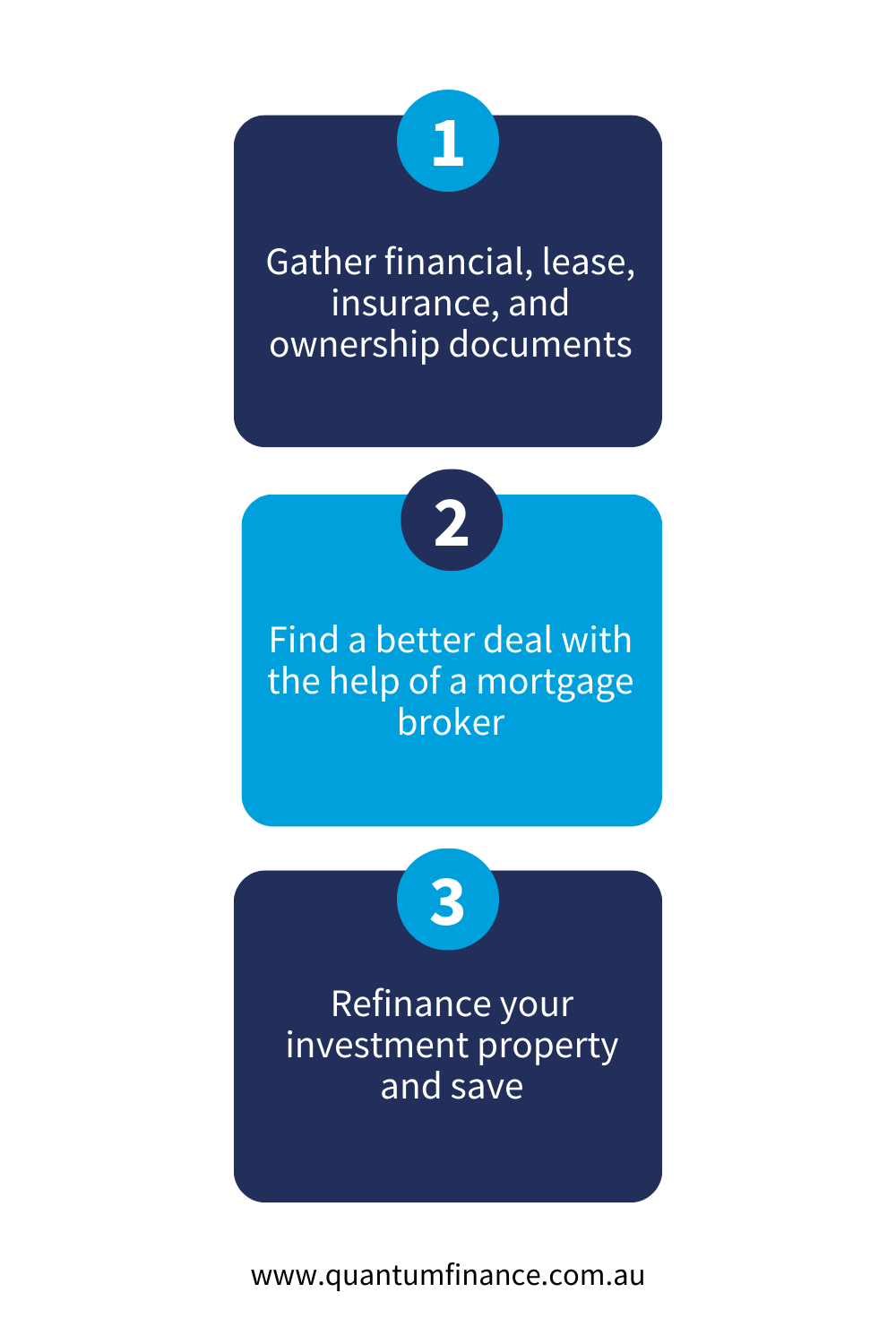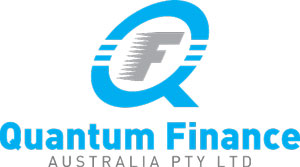
How to Refinance an Investment Property
If you are thinking about refinancing an investment property, you are not alone. Many owners of investment properties are looking into refinancing as a way to expand their returns.
For those wondering whether you can refinance an investment loan, the answer is simple. Yes, you can refinance an investment property. However, this process is slightly different to an owner-occupied refinance.
That is why I’ve prepared this how-to-guide for refinancing your investment property. For all the information you need, read on!
How to refinance your investment loan

Once you have made the decision to move forward with refinancing your investment property, you can follow these steps to complete the process.
1. Gather documents
Gather documents for the below purposes:
- To show your regular income
- To show the current leases on your property
- To show proof of homeowners insurance
- To show proof of ownership (including mortgage statements)
2. Find a lender
Recruiting the help of a mortgage broker can be helpful in the search for the right lender.
Myself and my team of mortgage brokers have access to dozens of lenders and hundreds of deals, and are ready to do all the hard work for you when it comes to finding and switching to your new lender or new loan from your existing lender.
However, you should expect interest rates for investment property refinancing to be higher than the rates to refinance an owner-occupied home.
3. Refinance
Most things are out of your hands once you reach this stage in your refinancing journey. Your final step is simply signing the paperwork and finalising your refinancing, and a mortgage broker like myself will handle the rest.
So, what are you waiting for? Start the refinance process now!
How much can I save by refinancing an investment property?
An excellent way to learn how much you can save when you refinance is to use our refinance calculator.
This takes the guesswork out of refinancing an investment property, making your decision to begin refinancing fact-based.
For an estimate that is tailored to your specific loan and needs, get in touch with a mortgage broker such as us.
How to get a better rate
Borrowers who usually get the best rates have the following in common:
- Their investment property is habitable
- They have built significant equity
- They have a high credit score
However, if you don’t have one (or any) of the above, there could still be a solution for you that is better than what you are currently getting.
The best way to get a better rate regardless of your credit and equity is to use a mortgage broker. We are across hundreds of deals and work with dozens of lenders to find the one deal that is most right for your needs. Get in touch today!
Things to avoid
It is worth noting that you should always look at the product as a whole and not be swayed by enticing offers. Three offers you should be aware of are:
The honeymoon rate
This is a loan featuring a lower introductory interest rate for a limited period of time. For example, an interest rate of 3% for the first year of the loan will usually get attention. The honeymoon rate usually looks great on paper. However, make sure you are prepared for higher interest and repayments once the introductory period is over.
Attractive home loan hooks
Another enticement to get potential borrowers in the door, the home loan hook typically offers a low rate, reduced fees, or another product to sweeten the deal, such as cash back.
The problem with these hooks is that many borrowers are focused on the hook and do not notice other details that are in the fine print.
Overly-exaggerated tax deductions
You can expect to get various tax deductions when you refinance an investment property. However, some lenders greatly oversell the deductions that are possible.
Judicious use of words such as may and might keep the advertising ‘truthful’, but the fact remains that many would-be borrowers focus on the deductions that are pushed to the forefront of ads.
The best way to determine your available deductions based on refinancing an investment property is to speak to your tax expert.
If you do consider a lender touting the breaks you will get on your taxes, be sure to go over the paperwork carefully before agreeing to anything.
Refinancing too soon
Avoid trying to refinance your rental property too soon.
Technically, you can refinance your investment loan right away. However, this is rarely in your best interest. You will need to compare potential savings to the costs you will need to pay.
For example, if you owe more than 80 per cent of your property’s value, you will have to pay lenders mortgage insurance (LMI). It’s best to build the amount of equity in your home to at least this level before refinancing.
Reasons to consider refinancing an investment property
Perhaps the idea of refinancing your investment property has never crossed your mind. Or maybe it has, but you are unsure if it is worth your while to try.
Just as you had to weigh the pros and cons before buying your investment property, you should take a look at why it can be in your best interest to move forward with the idea.
Here are a few reasons to consider.
- Refinancing can put you in a better position: The mortgage you started with may have been ideal at the time. However, it is likely that circumstances may have changed.
- Consolidating your debt: If you have home loans along with car loans and credit card debt, you may be paying a significant amount of interest. Additionally, keeping track of your debts can be frustrating, especially if things slip through the cracks occasionally. By refinancing your investment property, you can bundle your debts into a single payment each month. Another positive is that the interest rate you pay will be the same as your home loan.
- Adding helpful loan features: A new loan can be a game changer if you would benefit from including an offset account or redraw facility.
- Taking advantage of available equity: By refinancing your investment property, you can obtain the money to fund other investments. Often, property owners can access up to 80 per cent of their investment property value.
- Changing your monthly repayment amounts: It is always worth the time to look over your mortgage and compare your rates to what you can get through refinancing. Additionally, the periodic checks will alert you to loyalty fees. (The practice of banks charging existing customers more than new customers)
Benefits and costs
While the process is very similar to home loans, refinancing an investment loan has several essential facets you should understand before committing to the process.
Benefits
There are a number of ways you can benefit from refinancing your investment property, including:
- Switching between fixed and variable rates can be a great help if you want a different way to pay. Some people are more comfortable with routine and benefit from fixed rates. While others appreciate the flexibility a variable rate offers.
- Reduce your repayments and potentially save thousands
- Use your equity to fund other things like renovations or more investments.
- Access to tax breaks not available to owner-occupiers, including:
- Any title search fees charged by the lender
- Early discharge fees
- Fixed-rate loan break fees
- Lenders mortgage insurance
- Loan establishment fees, including application fees
- Mortgage broker fees
- Tax deductions for the borrowing costs you compiled by refinancing your mortgage.
- Valuation fees charged by the lender
- Not all of these tax deductions will apply to every investment property refinancing situation. For a complete list of what tax breaks apply to you, consult your tax specialist.
Costs
There are several costs (monetary and otherwise) that go along with refinancing an investment property, such as:
- The fees associated with refinancing, like application fees, discharge fees, settlement fees, mortgage registration fees, exit fees, or break costs
- The amount of paperwork included in the process, such as proof of rental income, proof of personal income, a good credit score, and few to no vacancies.
How long does a refinance take?
In my experience, refinancing an investment property can take anywhere from 3 days to 6 weeks.
For more information to help you figure out how long it might take for you, read our blog on refinance timelines and how to speed these up.
Conclusion
Making the difficult choices that help you the most is a significant part of owning an investment property. Sometimes, the options are simple and obvious, yet others require the expertise of a financial professional.
If you are on the fence about refinancing your investment property (or need advice regarding any other financial issue), do not hesitate to get in touch with a Quantum Finance mortgage broker.
With nearly two decades of experience helping people manage their money and build their portfolios, we have the skills needed to help you as well.


